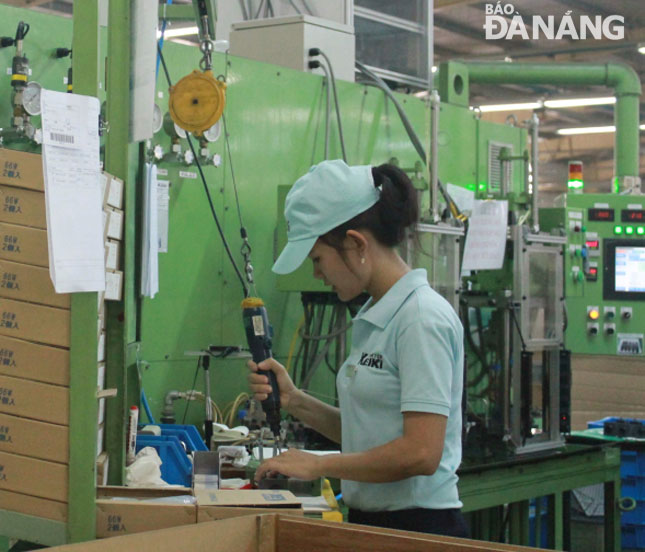Suggestions by Japanese investors for better business environment
Sharing many similarities in the cultural characteristics with Japan, Da Nang has emerged as a magnet for Japanese investors in recent years. Below are expectations and suggestions made by Japanese businesspeople about effective measures to ensure a better investment environment in the coming time, as well as about the city’s development strategies.
 |
| It is an urgent need to foster the professionalism of the local labour force to attract more foreign investors to the city. A worker (pictured) on her working shift at the Tokyo Keiki Precision Technology Company at the Da Nang Hi-tech Park |
Mr Masayoshi Arimoto, the developer cum founder of the SpaceA, a co-working space for start-up businesses positioned in Son Tra District, underlined a must need for the city to open more convenient information points.
Upon his arrival in the city to do business, Masayoshi Arimoto realised that many foreign investors usually encounter some difficulties due to the language and culture barriers.
He pointed out to the fact that small-scale businesses involving in operating restaurants and hotels usually spend much time registering for appointments with the municipal Investment Promotion and Support Board.
“I would like more dedicated venues to be set up to provide small-scale foreign investors with necessary information they needed to know about the local business and investment environment, like convenient information kiosk, for instance”, he emphasised.
Mr Michio Saruhashi, the General Manager of the Tokyo Keiki Precision Technology Company at the Da Nang Hi-tech Park, remarked, one of the main reasons why many Japanese investors choose Da Nang as their ideal investment destination is the abundance in human resources, along with its friendly and hard-working residents.
The Japanese businessman said his company once found it very hard to recruit employees, partly because its location in the city’s Hi- tech Park, located in Hoa Vang District’s Hoa Lien Commune, is right far from the city center.
Another issue of concern needed to be resolved is how to promote the professionalism of labour force, especially workers who once got involved in farming in rural areas or self-employed jobs for a long period. Many companies have to offer training to their newly-recruited employees on working behaviour, professional kills and foreign languages.
Given the promotion of professionalism, Da Nang is expected to boast higher quality human resources in order to become more inviting to foreign investors.
In his remarks, Mr Niwa Dai, the General Director of the Niwa Foundry Da Nang positioned at the city’s High-tech Park, noted, like Ha Noi and Ho Chi Minh City affirming their leading positions in the northern and southern regions respectively, Da Nang is a driving force of growth for the central region thanks to its great development potential in tourism services.
In his point of view, in comparison with these big hubs mentioned above, Da Nang is less densely populated, and investors from both home and aboard find it easier to access land for their business purposes.
Noticeably, Japanese investors operating in Da Nang show off their advantages and strengths in manufacturing industry and information technology- 2 important elements for the application of the Internet of Thing (IoT) solutions.
Given that fact, Da Nang should test new policies, ensure closer linkage amongst these 2 aspects in the current context of the Fourth Industrial Revolution, or Industry 4.0.